By Ivan Pereira
A Woodside man and three city employees were among the dozens of suspects indicted last week on charges of taking part in a pair of illegal gambling rings that stretched from Queens to Latin America, the Queens district attorney said.
A total of 38 defendants were indicted April 7 on various counts accusing them of operating sports betting Web sites that raked in millions of dollars over the last three years, according to DA Richard Brown.
It is illegal in the United States to run online gambling, according to authorities, and the conspirators used special computer servers in Costa Rica to take bets for professional hockey, baseball and football games as well as other sports, the DA said.
“Such computerized wire rooms operate around the clock and can handle a large volume of bettors at any one time, thus allowing the organizers to increase their illicit profits without having to bother with the time-consuming record-keeping aspects of a more traditional, paper-based bookmaking operation,” Brown said in a statement.
The investigation into the “Crown Sports” operation began in July 2007 and lasted till March, according to the DA. The NYPD’s organized crime investigation division teamed up with police departments in several states and conducted wiretaps, physical surveillance and other court-approved monitoring, Brown said.
One group of bookies, led by Robert Baselice of Staten Island, allegedly used his Web site to collect bets and hired “money collectors” to deliver and transfer the winnings to other members of the organization, the DA said.
The suspected “agents” included Emil Ganzerla, 55, of 50th Avenue in Woodside; Matthew Fopeano, an FDNY employee; and Michael Labetti, a city Department of Transportation employee, according to Brown. Fopeano performed some of the illegal transfer of funds on the city’s time, the DA said.
“The firefighter is accused of delivering gambling proceeds while driving a marked FDNY SUV,” he said.
A second group of bookies was allegedly led by Robert Ackrish, a sanitation worker, and his father Frank, according to Brown. Combined the two rings netted nearly $178 million from the illegal bets, the DA said.
Those who placed the bets would have their personal information stored on the overseas servers that would bounce the data to other servers to avoid the authorities, Brown said.
“Unfortunately for the defendants, the law enforcement community is just as adept in using new technology to stop those involved in such criminal pursuits,” he said.
Brown also noted that shutting down the sites helped those who spend thousands of dollars on the betting rings and get into serious financial and mental problems. The DA noted that 10 percent of college students are gambling online.
“Illegal gambling is not a victimless crime. Those who participate in illegal gambling are usually victims of threats,” he said. “It’s highly addictive.”
Reach reporter Ivan Pereira by e-mail at ipereira@cnglocal.com or by phone at 718-260-4546.



































